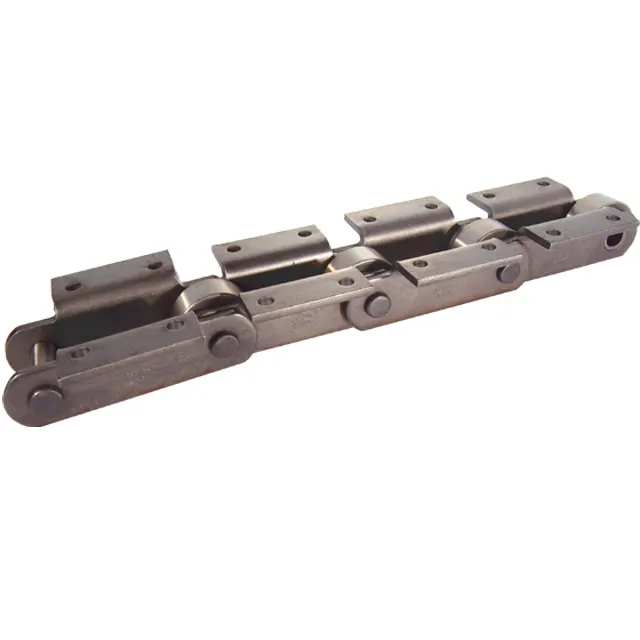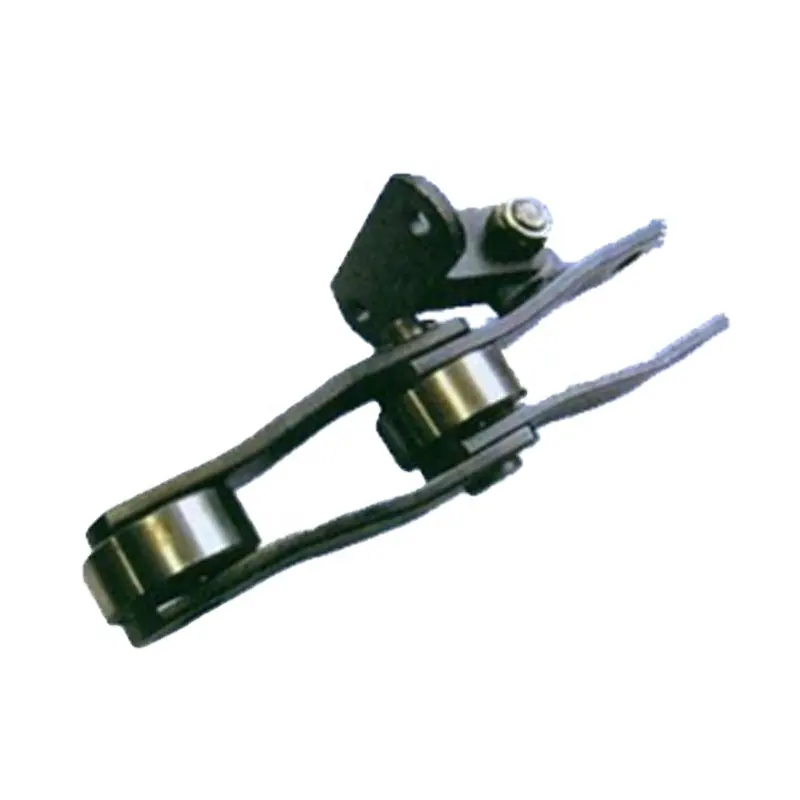Product Description
Product advantages:
| — Ten CoreTechnologies — | |||
| 1 | Chain strengh preload technology | 2 | Pin CRV treatment technology |
| 3 | Plate smoothly punching technology | 4 | Bush oil hole technology |
| 5 | Vacuum Oiled Technology | 6 | Precision Punching Technology |
| 7 | Low frequency fatigue test technology for lange size chain | 8 | Chain length comparison technology |
| 9 | Variation of silence design technology | 10 | Chain dynamic testingtechnology technologies |
Our Advantages:
1. Any inquiry you make will be answered professionally within 6~8 hours.
2. Attaches great importance to product quality and approved by many global quality system certification,such as France, Norway, Germany.
3. Focused on Chain since 1999, have rich experience in Production.
4. High-quality workers,First-class advanced equipment,good quality control,advanced technology.
5. Be Good at Custom-Made Products, provide customized services for customers.
6. Participated in the drafting of 24 national and industrial standards such as chains.As of 2571-Mar, CHOHO has 180 authorized patents.
7. With the responsibility of “Providing high quality chain system with the same service life for the global locomotive industry”, have established a strong R&D team.
By 2571,CHOHO has more than 2,7.
-CHOHO has 4 subsidiaries, including testing technology and international trading companies. has 4 factories in HangZhou, Thailand factory, ZheJiang R&D Center and Tokyo R&D Center. In addition, CHOHO ZHangZhoug Industrial zone is expected to be completed & put into operation next year.
-We specialized in producing all kinds of standard chains and special chains, such as Agricultural Chain, Sprocket, Chain Harrow, Tillage Parts,Rice Harvester Chain, GS38 Chain, Roller Chain, Automobile Chain, Motorcycle Chain Industrial Chain and so on.Our partners among world top enterprises, such as LOVOL,JOHN DEERE,NEWHOLLAND, CLASS,AGCO,DEUTZFAHR,HONDA, KUBOTA etc.
FAQ:
1. Are you manufacturer or trade Company?
We are a factory focused on producing and exporting Chain over 23 years,have a professional international trade team.
2. What terms of payment you usually use?
T/T 30% deposit and 70% against document, L/C at sight
3. What is your lead time for your goods?
Normally 30~45 days.Stock can be shipped immediately.
4. Do you attend any Show?
We attend Hannover show in Germany, EIMA in Italy, CHINAMFG in France, CIAME in China and many other Agricultural machinery shows.
5.Do you offer free samples?
Yes,we can.or you just bear the shipping cost.
6.Is OEM available?
Yes, OEM is available. We have professional designers to help you design.
/* January 22, 2571 19:08:37 */!function(){function s(e,r){var a,o={};try{e&&e.split(“,”).forEach(function(e,t){e&&(a=e.match(/(.*?):(.*)$/))&&1
| Standard or Nonstandard: | Standard |
|---|---|
| Application: | Conveyer Equipment, Agricultural Machinery |
| Surface Treatment: | Polishing |
| Structure: | Roller Chain, Agricultural Machinery Chian |
| Material: | Alloy |
| Other Characteristic: | High Wear Resistance |
| Samples: |
US$ 1/Meter
1 Meter(Min.Order) | |
|---|
| Customization: |
Available
| Customized Request |
|---|

How do mill chains perform in corrosive environments, such as chemical processing plants?
Mill chains are designed to perform well in corrosive environments, including chemical processing plants, where exposure to aggressive chemicals and corrosive substances is common. Here’s a detailed explanation of how mill chains perform in such corrosive conditions:
1. Corrosion-Resistant Materials: Mill chains are often made from stainless steel or other corrosion-resistant materials. Stainless steel, in particular, contains chromium, which forms a passive oxide layer on the surface, providing excellent corrosion resistance to many chemicals found in chemical processing plants.
2. Resistance to Chemicals: Mill chains made of stainless steel or other suitable materials exhibit resistance to a wide range of chemicals, including acids, alkalis, and various corrosive substances used in chemical processes. This resistance helps prevent chain degradation and elongation, ensuring a longer service life.
3. Enhanced Durability: The corrosion-resistant properties of mill chains contribute to their overall durability in corrosive environments. They can withstand exposure to aggressive chemicals without experiencing significant deterioration or weakening.
4. Low Maintenance: Mill chains used in chemical processing plants generally require minimal maintenance due to their ability to resist corrosion. This low maintenance characteristic is beneficial in industrial settings where downtime for repairs can be costly.
5. Reliability: In chemical processing plants, reliable equipment is essential for efficient and safe operations. Corrosion-resistant mill chains provide reliable performance, reducing the risk of unexpected chain failure or breakdowns.
6. Material Selection: Proper material selection is crucial when choosing mill chains for chemical processing plants. Engineers and plant operators should consider the specific chemicals used in their processes and select the appropriate chain material to ensure optimal performance and longevity.
7. Resistance to Temperature Extremes: Some chemical processing applications involve extreme temperatures. Mill chains made from high-quality materials can maintain their performance and integrity under such temperature variations, ensuring smooth operation even in challenging conditions.
8. Customization: Mill chains can be customized to suit the specific requirements of chemical processing plants, such as varying chain pitch, attachments, and strength levels to handle different loads and applications.
Overall, mill chains are a reliable choice for corrosive environments, including chemical processing plants. Their corrosion resistance, durability, low maintenance, and ability to withstand various chemicals make them well-suited for handling the demands of chemical processing applications.

Can mill chains be used in petrochemical processing and refineries?
Yes, mill chains can be used in petrochemical processing and refineries, but the selection of the appropriate chain type is crucial to ensure optimal performance and safety in these demanding environments. In petrochemical processing and refineries, mill chains are often employed in various applications, including material handling, conveying, and elevating tasks.
The key considerations when using mill chains in petrochemical processing and refineries include:
- Corrosion Resistance: Petrochemical environments can be highly corrosive due to exposure to chemicals and moisture. Therefore, selecting mill chains made from corrosion-resistant materials, such as stainless steel or plastic, is essential to prevent premature wear and failure.
- Temperature Resistance: Petrochemical processes often involve high temperatures, so it’s important to choose mill chains that can withstand the specific temperature range of the application without losing their structural integrity or mechanical properties.
- Chemical Compatibility: The mill chains must be chemically compatible with the substances being handled in the petrochemical processes. Compatibility ensures that the chains won’t react with the chemicals, preventing contamination or degradation.
- Load Capacity: Depending on the application, mill chains must be capable of handling the required loads and forces present in the petrochemical processing and refining operations.
- Reliability: In critical processes within petrochemical facilities, reliable mill chains are essential to ensure uninterrupted operation and prevent costly downtime.
- Safety: Safety is of utmost importance in petrochemical processing. Employing mill chains with proper safety features, such as overload protection and anti-jump guides, is vital to minimize the risk of accidents.
Regular maintenance and inspection of the mill chains are also necessary to ensure their continued performance and to detect any signs of wear or damage promptly. Overall, when chosen and used correctly, mill chains can effectively meet the demands of petrochemical processing and refineries, providing a durable and efficient solution for material handling and conveying needs.

What are the maintenance requirements for mill chains to ensure optimal performance?
Proper maintenance is essential to ensure the optimal performance and longevity of mill chains. Regular inspections and care help identify and address potential issues early, preventing costly downtime and equipment failures. Here are the key maintenance requirements for mill chains:
1. Regular Inspections:
Perform routine visual inspections of the mill chains to check for signs of wear, damage, or misalignment. Look for elongation, excessive wear on pins and bushings, and any loose or broken components.
2. Lubrication:
Ensure proper lubrication of the mill chains. Lubrication reduces friction and wear, dissipates heat, and prevents corrosion. Follow the manufacturer’s recommendations for lubrication intervals and use the appropriate lubricant for the specific operating conditions.
3. Cleaning:
Regularly clean the mill chains to remove dirt, debris, and accumulated particles. Clean chains function better and reduce the risk of abrasive wear.
4. Tension Adjustment:
Maintain the correct tension in the mill chains. Improper tension can lead to premature wear, elongation, and failure. Refer to the equipment’s manual or consult with the manufacturer for the appropriate tensioning procedure.
5. Replacement of Worn Components:
Replace any worn, damaged, or broken components promptly. This includes pins, bushings, rollers, and any other parts that show signs of wear. Using worn-out components can lead to chain failure and damage to other parts of the machinery.
6. Environmental Considerations:
Take into account the operating environment and make any necessary adjustments to maintenance procedures. In harsh or corrosive environments, additional protective measures, such as coatings or seals, may be necessary.
7. Regular Training:
Ensure that maintenance personnel are well-trained in handling mill chains. Proper handling and installation can significantly impact the chain’s performance and lifespan.
8. Record-Keeping:
Maintain detailed records of maintenance activities, including inspections, lubrication schedules, and component replacements. These records can help identify patterns, track chain performance, and plan future maintenance tasks.
By adhering to these maintenance requirements, operators can optimize the performance and service life of mill chains, reducing downtime and improving overall efficiency in material handling and industrial applications.


editor by CX 2024-04-09